- Home
- Upton Sinclair
Wide Is the Gate (The Lanny Budd Novels) Page 4
Wide Is the Gate (The Lanny Budd Novels) Read online
Page 4
VI
Meanwhile, Lanny was motoring his father to the Chateau de Balincourt, once the home of King Leopold, misruler of the Belgians, and now the retreat of Sir Basil Zaharoff, retired munitions king of Europe and not retired Knight Commander of the Bath of England and Grand Officer de la Legion d’Honneur de France. The old gentleman was in his middle eighties, and saw very few people, but Lanny Budd possessed the key to his castle and his heart. Not merely had he known the noble Spanish lady who had been the old man’s wife, but he had received her messages from the spirit world through a Polish medium whom he had discovered. Sir Basil would be most happy to see Mr. Budd and his son, so the secretary had said over the telephone; would they be able to bring Madame Zyszynski along with them?
Robbie talked about the strategy of approach to one of the most wary of men. “Talk to him about the duquesa,” said the father. “Can’t you recall something that will get him warmed up?”
“Beauty has been getting some interesting messages purporting to come from the Caillards,” replied the son.
“Fine! Tell him about them; and if you can say that the spirits are riding in airplanes, that would really fetch him!” Robbie said that with a grin. He didn’t exactly ask that his son should make up some story about Zaharoff’s dead wife in the other world, yet if Lanny had proposed doing that, his father wouldn’t have objected. It is all right to have scruples, but they should be used with discretion, and not while dealing with an old spider, an old wolf, an old devil, who for more than a generation had played with the nations of Europe as casually as other men play with chessmen on a board.
The lodgekeeper came out and looked them over; evidently he had his orders, and the gates swung back, and they drove up a broad driveway to the stone chateau—two stories, rather squat, but with wide-spreading wings. A turbaned Hindu servant admitted them; all the servants were from Madras. It was a damp and chilly day, and the master, wearing a green smoking-jacket, sat before the fireplace in his very grand library, which went up the two stories and had a balcony with heavy bronze railings. All those books, at which Lanny gazed hungrily; he doubted if half a dozen of them were opened in the course of a year. The old man no longer had any hair on the top of his head, but still had the white imperial below it; his skin was drawn and yellowish brown like old parchment. He did not rise from his seat or offer one of his palsied hands, but put cordiality into his tone as he told them to take the seats which had been placed for them.
“Sir Basil,” said Lanny, at once, “have you heard that ‘Birdie’ is coming through?”
“Nobody troubles to tell me anything any more,” was the sad reply.
“My mother wishes me to tell you about it.” Beauty Budd and the Knight Commander of the Bath had both been guests of Lady Caillard in London not long before she had “passed over.” She had been an ardent spiritualist and had made the usual promises to communicate with her friends from the other side. She had lived surrounded by mediums, and of course it was inevitable that these would begin getting messages from her. “Birdie,” as she was known, had been strong on emotions but weak on brains; and it was to be expected that her words from the spirit world should bear that same character. “Vinnie” was Sir Vincent Caillard, who had been Zaharoff’s business partner in Vickers-Armstrong and had been no fool, even if he had thought himself a maker of music as well as of munitions. Zaharoff knew his mind and thousands of things that had been in it. Now he listened attentively while Lanny told what he could remember of the seances.
“Oh, God, how I wish I could believe it!” exclaimed the lonely old man. His beard waggled as he talked, and he leaned forward, thrusting his hooked beak forward as if he thought he could smell the younger man’s real thoughts. Lanny knew the one idea that was in his mind: was he ever going to see his beloved duquesa, the only person for whom he had really cared in a long life? He wanted so to believe it—and yet he hated so to be fooled! He wanted to hear that Lanny believed it; and yet, even if he heard it, he wouldn’t be sure whether Lanny was being honest with him. When one had been outwitting other people for three-quarters of a century, how can one believe that anybody is being straightforward?
They sat close together, and their eyes met in a long stare. It was as near as they could ever come to intimacy. “Tell me, Sir Basil,” asked the younger man, “have you any religion?”
“None, I fear,” was the reply. “I have wished that I might. But how can a God permit what I have seen in this world?”
“A God might be leaving men to work out their own destiny.”
“A God who made them what they are?”
“You believe, then, that you are an accident?”
“That seems to me the politest supposition I can make about the universe.” It might have been humor, and it might have been tragedy; Lanny guessed that it was some of each.
VII
Not for a large amount of money would Robbie Budd have interrupted this conversation. He listened and watched and thought, like the practical psychologist he was. He was interested not in the question of where Sir Basil was going to spend his future years, but only in what he was going to leave behind him. Anyone who didn’t like Robbie would have said that his motive was greed, but Robbie would have treated such a person with quiet contempt; he had his answer, which Lanny had known by heart from his earliest days: Robbie wanted to get things done, and money was the means of doing it.
An engagement was made for Madame Zyszynski, the medium, to come to Balincourt for another visit, so that Sir Basil might find out if “Birdie” wished to talk to him. After which the old man must have realized that he wasn’t being quite polite to the older of his guests; he turned, saying: “Well, Mr. Budd, what are you doing these days?”
It was an opening, and Robbie was prompt to take it. He replied: “I have come to ask for advice, Sir Basil.” His host said that he would give it if he could, and Robbie went on: “I have been studying the world situation, on the basis of the best data I can get, and have come to the conclusion that the industry of the future is aviation. I believe it will be for the next generation what the automobile was for the last.”
The older man listened and nodded now and then as Robbie elaborated this thesis. Yes, it was true; he wasn’t going to be here to see it, but it was bound to happen; any nation that didn’t take to the air might as well give up before the next war started. If Mr. Budd knew sound aviation shares, those were the things to buy.
“That is not exactly what I am thinking of, Sir Basil.” Robbie went on to tell about his dream of a perfect place for a perfect fabricating plant. “Airplane factories have been scratch affairs so far, and their techniques are based on small-scale operations. What I have in mind is to apply the principles of mass production to this new job; I want to put airplanes on a belt.”
“That is a pretty large order, Mr. Budd.”
“Of course; but if the industry is to be large, the order must be the same. Sooner or later somebody is going to become the Henry Ford of the air. He tried it himself, but has given up—just when success had become possible.”
It was Lanny’s turn to listen and watch and think; he, too, was something of a psychologist, though hardly a “practical” one. This aged plutocrat took on suddenly the aspect of a white-bearded gnome, sitting on a heap of treasure and watching with fear-stricken eyes every creature that came near. He had by now made sure that Robbie Budd wanted his money, and a lot of it, and he had lost every trace of that expansiveness which conversation about Vinnie and Birdie had produced. This was danger!
But still he couldn’t quite bear to break off the interview. The visitor was talking about profits, dividends of old-time magnificence. The Knight Commander and Grand Officer had known Robbie Budd for thirty years, and judged him a solid and capable fellow; no speculator, no fly-by-night promoter, but one who put money to work and himself to work with it. At the Genoa Conference, where Robbie had been Zaharoff’s agent, he had acted with competence; later, when Zaharoff had
gone in on New England-Arabian Oil, he had got the better of Robbie—but not enough so that he would look on his associate with contempt.
“You couldn’t ignore what a man like that was telling you. You couldn’t help but be aroused, even if only by the memories which his voice and manner recalled. Those had been the days, and Zacharias Basileos Sahar or Zahar, who had been born of Greek parents in a peasant hut in Turkey and had become the real behind-the-scenes master of Europe, he was one who could say with the ancient Greek hero that much had he seen and known: cities of men, and manners, climates, councils, governments; himself not least, but honored of them all. If he couldn’t exactly say that he had drunk delight of battle with his peers far on the ringing plains of windy Troy, at least he could claim to have sent a hundred thousand other men to drink that dubious delight. Those windy plains were near to the village of Mugla, where Zacharias Basileos had started his career, and also to the scene where twelve years ago his personally financed Greek army had been slaughtered by the Turks.
VIII
Robbie Budd expatiated upon the defenses of Montauk Point, and the safety of Long Island Sound and its tributary rivers as a nesting-place for war industries; he told about railroad connections, and steel that was brought from the Great Lakes through the Erie Canal and the Hudson River. He pictured the factory of steel and glass he was going to build, air-conditioned, a twenty-four-hour-a-day plant. He showed the drawings of his air-cooled radial engine to Zaharoff, who had owned tens of thousands of engines. In its lighter parts Robbie was going to use magnesium, a metal which the industry had slighted. Small shavings of it are explosive, but he had a method of gathering them up automatically. Instead of hammering the cast parts into place he was going to freeze them in liquid air and set them, and when they had returned to normal temperature they were there for life. When he was running tests on his engines he was going to hitch them up to generators and so make electricity for his plant.
So many new ideas this hard-driving Yankee had, and the retired munitions king watched him as a fascinated cobra watches its Hindu charmer. “I am an old man, Mr. Budd,” he pleaded, pathetically. “My doctors tell me that I must avoid the slightest strain. I have my safe investments, and find that it disturbs me to think about shifting them.”
“Yes, Sir Basil,” agreed the promoter; “but this is the sort of thing that comes only a few times in a long life. Here is the one really live industry, the one that is going to shove everything out of its way. We shall make our turnover every few months—I don’t want to exaggerate, but I have studied the field thoroughly, and I cannot see how we can fail to make enormous profits.”
The operation of greed in this aged Greek trader’s psychology was something automatic. He was like some old toper who has sworn off, but cannot resist the sight and smell of his favorite beverage; like Rip Van Winkle: “This time don’t count!” Lanny, watching him, saw a light gleaming in the cold pale-blue eyes; the palsied fingers seemed reaching out for the treasure and the old white imperial seemed waggling with excitement.
What did he want with more money? What could he imagine himself doing with it? Here he was, with all but one or two toes in the grave, and, whatever else he might believe about the future, he couldn’t expect to take Budd-Erling stock with him. He had no one to inherit it but his two married daughters, and what could they do with it? Lanny’s mother had met them in society, and reported them as entirely undistinguished persons. They would inherit several billions of francs—nobody knew the real figure. Yet Zaharoff had to have more; it was the nature of his being.
Robbie had him at a disadvantage, because he knew so much about the old man’s affairs: his staff, his attorneys, the advisers he trusted. Robbie had already talked to one of them, and perhaps—who could say?—promised him a douceur, a “sweetener.” He knew how easy it would be for Zaharoff to order the sale of a million dollars’ worth of bonds, and the buying of Budd-Erling preferred, with an equal number of common shares for bait. Robbie waved this bait in front of Sir Basil’s prominent nose, and it followed this way and that. Lanny saw that there was going to be a “killing,” and the procedure made him faintly sick, but he decided that this was sentimentality. Who would worry about the fate of an old spider, an old wolf, an old devil?
After all, Zaharoff would get real value for his money. There was really going to be this wonderful building, with a long line of objects moving along slowly and being constantly added to by parts taken from overhead conveyors, until each in turn became recognizable as an airplane and finally rolled off on its own wheels, ready to mount upon the air. All this would continue, long after Sir Basil had gone to his duquesa; as long as civilization endured, with its paper titles of ownership, his descendants would be entitled to dividend checks payable at the First National Bank of Newcastle, Connecticut.
The upshot was that Sir Basil took a copy of Robbie’s “set-up,” promising to study it, and if he found it according to Robbie’s statements, to come in on the deal; he wouldn’t say for how much, but would let Robbie know in a couple of days. The promoter was in high spirits on the drive back to Paris. It was the best day’s work he had done since the depression, he said; you can’t keep a good man down!
IX
Lanny ought to have been a true son of his father and done his share in the making of this new Budd glory. Robbie had cherished that hope for many years, but had had to give it up. He had two sons by his wife in Connecticut; solid fellows, nearing thirty, they would be his right hand and his left. Lanny would sell a block of his securities and put the money into his father’s enterprise, and then he would go back to playing the piano, advising purchasers of art works, and dreaming of seeing the world a less cruel place.
What he did now was to go for an afternoon stroll along the pleasant streets of Paris in the pleasantest season of the year. There was a visit he wanted to pay, and he wasn’t going to tell his father about it. His mother, perhaps—she couldn’t very well object to his visiting her brother, who had befriended her and had never done her the least harm. But with Robbie it would mean the starting of an argument, and what was the use? Lanny wouldn’t tell his wife, either, for that would mean another argument, and of even less use.
Lanny Budd, good-looking, rich, and called a darling of fortune, was a man with a secret vice; and like many such unfortunates, having learned what other people thought of his weakness, he had evolved subtle devices to protect himself. He didn’t enjoy lying, so when he stole away to practice his vice he would include in his journey some innocent occupation such as looking at pictures; then when Irma asked him what he had been doing, he would answer: “Looking at pictures.” He would learn to keep silent on all subjects that might possibly be connected with his vice and bring it to his wife’s mind. What you don’t know won’t hurt you—such is the maxim of erring husbands.
The fact that he refused to recognize his vice for what it was made a difference to him, but, alas, it made none to Irma; and he had had to learn the lesson that if what you do brings unhappiness to someone you love, the question of vice or virtue is a mere matter of words. They had said all the words it was possible to say on the subject, and it hadn’t made any difference; so now Lanny had walled off a portion of his life and mind from most of his friends, including the woman who was dearest to him.
Lanny’s vice was that he liked to talk to “Reds”; he liked to meet them, and hear them discuss the state of the world and what they were proposing to do about it. Whenever he expressed his own opinion, he got into an argument with them, too, but he took that as part of the fun. He didn’t mind if they denounced the system under which he enjoyed a delightful leisure; he didn’t even mind if they denounced him, calling him an idler, a playboy, a parasite. He didn’t mind if they got his money, and then refused to pay the tribute of gratitude, saying that it wasn’t really his money, he had no right to it, it belonged to the wage-slaves, the disinherited of the earth—in other words, to themselves. These things infuriated Irma, but Lanny t
ook them all with a grin.
There was some kind of queer streak in him which Irma and her friends couldn’t make out; some called it “yellow,” though not often in Irma’s hearing. The grandson of Budd’s had somehow got fixed in his mind the notion that he wasn’t entitled to his money and, worse yet, that Irma wasn’t entitled to hers. It was like a thorn buried deeply in his conscience; it festered there, and no surgery had been able to extract it. This caused him to take an apologetic attitude toward disturbers of the social peace and made him their predestined victim; a soft-shell crab in an ocean full of hard-shell creatures. Irma had her own ideas about “parasites”; she thought they were the grumblers and soreheads, the crackpots and cranks who wrote letters to her husband and laid siege to his home, in the effort to dump their sorrows into his heart and their burdens onto his shoulders.
Irma had tried to be good-natured about these annoyances, up to the last year or two; but the episode of the Robin family had broken her patience. She blamed all the misfortunes of that family upon the doings of the Red Hansi and the Pink Freddi and the failure of the head of the family to control his wayward sons. She went further and blamed all the troubles of Europe upon the activities of the Bolsheviks. It was their threats of class war and wholesale robbery which were responsible for the development, first of Fascism in Italy and then of Nazism in Germany. When the well-to-do classes found they could no longer sleep safely in their beds, naturally they hired someone to protect them. Hadn’t Irma and Lanny themselves done it, for the safety of their “twenty-three-million-dollars baby”? Irma was quite willing to admit that Mussolini and Hitler and Goring were not the most agreeable types of people, but perhaps they were the best the well-to-do classes had been able to find in the emergency. Thus spoke, vigorously and frequently, the daughter and heiress of J. Paramount Barnes, one-time utilities king.

 Prince Hagen
Prince Hagen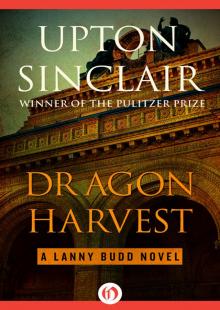 Dragon Harvest
Dragon Harvest The Jungle
The Jungle Sylvia's Marriage
Sylvia's Marriage Oil! A Novel by Upton Sinclair
Oil! A Novel by Upton Sinclair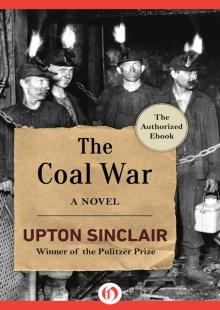 The Coal War: A Novel
The Coal War: A Novel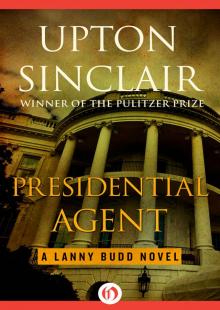 Presidential Agent
Presidential Agent World's End
World's End The Second-Story Man
The Second-Story Man O Shepherd, Speak!
O Shepherd, Speak!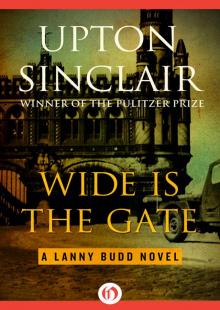 Wide Is the Gate
Wide Is the Gate The Return of Lanny Budd
The Return of Lanny Budd One Clear Call I
One Clear Call I 100%: the Story of a Patriot
100%: the Story of a Patriot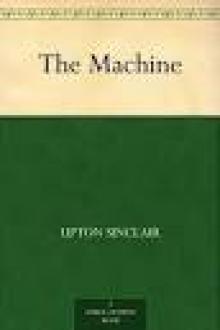 The Machine
The Machine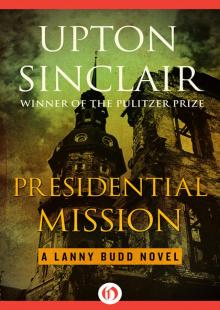 Presidential Mission
Presidential Mission A Cadet's Honor: Mark Mallory's Heroism
A Cadet's Honor: Mark Mallory's Heroism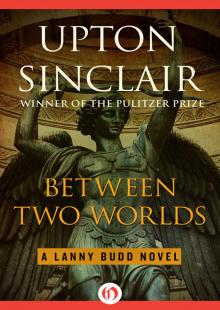 Between Two Worlds
Between Two Worlds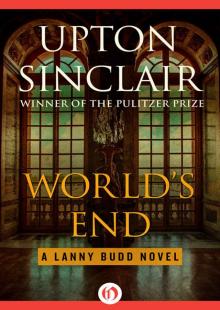 World's End (The Lanny Budd Novels)
World's End (The Lanny Budd Novels)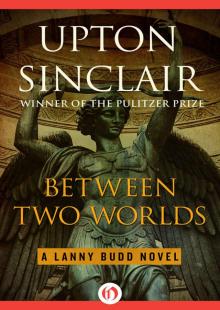 Between Two Worlds (The Lanny Budd Novels)
Between Two Worlds (The Lanny Budd Novels)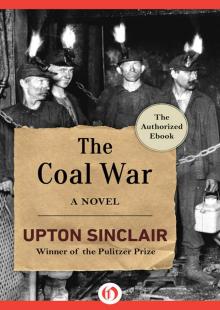 The Coal War
The Coal War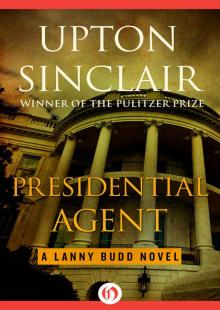 Presidential Agent (The Lanny Budd Novels)
Presidential Agent (The Lanny Budd Novels) Oil (filmed as There Will Be Blood)
Oil (filmed as There Will Be Blood) Wide Is the Gate (The Lanny Budd Novels)
Wide Is the Gate (The Lanny Budd Novels)